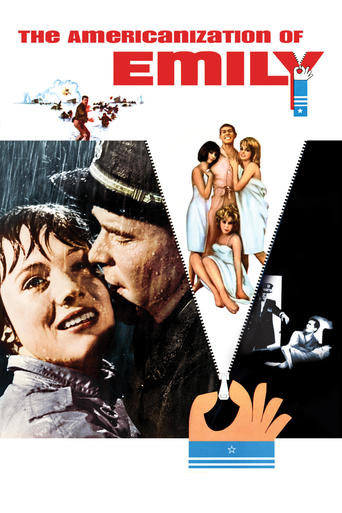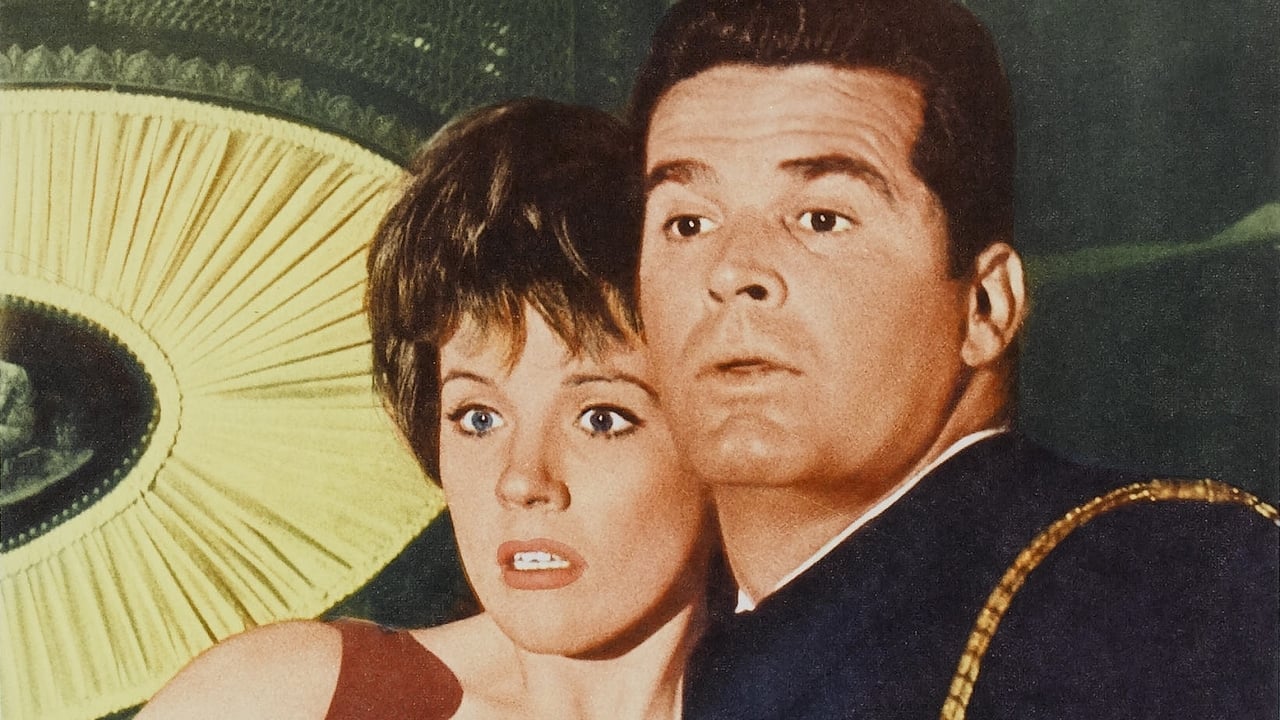claudiaeilcinema
Think of Network or The Hospital, Paddy Chayefsky was seeing into the future and what he saw was ugly. Here we have an insane admiral and how his men, who know he's crazy, stand in line to follow his wishes/commands. An anti war film without sentimentality. Julie Andrews is a total delight as the tough cookie with a razor sharp mind. James Garner has the best lines of his career. His tea with Joyce Grenfell is a superb written scene. Joyce Grenfell as Julie's mother is divine, yes, divine! Melvyn Douglas as the crazy man in charge is the Howard Beale of the situation and what he does with it is pure genius. Highly recommend it.
pingshar
In a modern world filled with films featuring actors pretending to be intelligent people saying simpleton lines of seven words or less, what a joy it is to see a film with intelligent people (played by great actors) saying intelligent, complex sentences (written by a great screenwriter).And what acting! I have always respected James Garner and Julie Andrews, but here they shine, as though they have embodied the very essence of their characters and projected it onto the screen. This is a love story set in wartime. It is the cultural differences and conflicts in values between the American and British leads that makes it interesting. The evolution of these characters drives the story. Despite their differences and initial dislike for one another, they fall in love. Yet, in spite of the seeming implausibility of the relationship, Andrews and Garner make it believable, without being saccharine or simplistic. None of the secondary roles come across as stereotyped or caricatures, a credit to Paddy Chayefsky's script, Arthur Hiller's direction, and fine acting. Well, almost none. Steve Franken does a fine drunk, a role he would reprise four years later in The Party, and Keenan Wynn adds to the well-placed (and plausible) comic relief during the invasion.We encounter the central essence of the film early on in Garner's scorching little speech: "We crass Americans didn't introduce war into your little island. This war, Ms. Barham, to which we Americans are so insensitive, is the result of 2,000 years of European greed, barbarism, superstition, and stupidity. Don't blame it on our Coca-Cola bottles. Europe was a going brothel long before we came to town." Far from being a "Sixties movie," those words still ring true today, as they would have in 1944. Yet, somehow, the British have turned gratitude for saving their butt to resentment. This movie provides the long lost clue, the grudge that Brits dare not speak of openly: The Americans were seducing their women with stockings and chocolate bars, while they were away at war. Some of the more beautiful even, gasp!, moved to America with them.The novel confronts this more directly, and makes this the meaning of "Americanization" of women, while the movie makes Americanization a more abstract change in values of Emily and her mother - a shift from patriotism to cynicism, to oversimplify it. And even that would engender resentment from the British today. Though this movie was released in 1964, it would not be entirely correct to call it a Sixties movie; it has more in common with Mr. Roberts - 1955, than more surrealistic antiwar works like MASH. Planning would have begun in 1963, probably before the death of JFK, and before the escalation of the Vietnam War with the Tonkin Gulf Resolution. So there was no antiwar movement when this film was made. That side of the Sixties was yet to come, and might never have, had JFK not been assassinated.This is not an antiwar movie, as the actors' lines make clear, but it is highly skeptical. It is about the anomie and louche values that can occur between the cracks of command during wartime. On the other hand, it followed Kubrick's Dr. Strangelove in 1964, also with a general anti-war theme, suggesting the American public was not in the mood to get into another war. No one actually said, Hey, let's go to war in Vietnam! President Johnson just backed us in.I'm glad this movie didn't adopt the more comic tone of Dr. Strangelove or MASH. I'm almost tempted to say it is not a comedy, except the opening scenes have a clear comic overtone. There are several layers to the movie, one being humorous - perhaps it could be describe as light black humor. The advantage of Hiller's style is it retains more realism. There are also shifts in that realism as we see Garner and Andrews in different situations, such as on a country pond, far from the war. Hiller does a fine job of presenting contrasting moods in wartime England. There is a strong feeling of ambiance, and fine presentation of the subtle interactions of the characters, thanks to the slower pace.So William Wyler was booted for tinkering with Chayefsky's script (why??). I love Wyler, but he was nearing the end of his career, while Hiller was a younger director with almost no movie experience, but tons of work on many fine American televisions series where he evidently honed his craft. The directing was fine, with one exception: The scenes of the actual landing of Garner at Normandy are hokey, though probably due to budget (and not having CGI, yet).They say this is the favorite movie of Garner and Andrews. Actors don't always like to watch their own movies. Andrews was not happy being stereotyped as Mary Poppins and Maria Von Trapp (with a script she viewed as "treacle"), though they are highly-respected works. Much of Garner's work was solid, though sometimes a bit light. My favorite is Support Your Local Sheriff, which I can't recommend too highly. But here we (and they) see acting with subtlety and depth in a setting that is not embarrassing for them to watch.Spoiler alert:Garner presumably marries Andrews in the end, an unhappy ending from the British perspective. I suspect that if you are British you will probably like this movie even less than the much despised U-571 (please see my review, headed: "Bangers and mash aren't fish and chips"). Yes, not all Brits hate Yanks.
MartinHafer
"The Americanization of Emily" is about an unlikely romance between an incredibly jaded and pragmatic naval officer (James Garner) and a very patriotic Englishwoman (Julie Andrews). She has little respect for him, as so many of her family sacrificed their lives in combat. He, on the other hand, already saw action and is very happy to have a cushy desk job. Inexplicably, the pair fall in love and slowly Emily is won over to Garner and his ways. The romance is quite lovely, by the way.The film also has another thread running through it--one that seems to have nothing to do with the romance and is more like "Catch-22" or "Network" (also by Paddy Chayefsky). The Admiral that Garner serves under (Melvyn Douglas) is losing his mind. And, despite there being no rational reason for doing this, he's about to send Garner on a suicidal mission. And, when this Admiral completely loses his mind and is hospitalized, his suddenly gung-ho junior officer (James Coburn) forces Garner to go on this nutty mission.If these sound like two entirely separate stories, well, you're right. They never really meshed well. In addition, James Coburn's character made zero sense at all. In the first half of this film, he's bedding every woman that moves. Later, inexplicably, he's off to murder his supposed best friend for public relations purposes. Huh?! The bottom line is that I am really not sure what the film was trying to say and it came off as highly uneven and weird--just to be weird.
teepee12
My husband and I count this in our top 10 favorite movies.I would put it there for the brilliant Paddy Chayevsky script alone. Charlie Madison's monologue on war is as apt today as it was when the movie first came out.The direction is wonderful, with flawless timing ... always a critical component in a comedy and the casting is perfect. I loved it when it was first released and I love it today on DVD. This is a comedy, but it's not only a comedy. It is an intelligent, thoughtful movie about war ... an anti-war movie for the thinking adult, as it were. If you haven't seen it, rent it, buy it, find it online. Absolutely worth the effort.



 AD
AD




